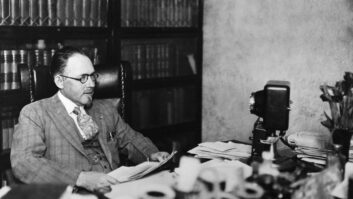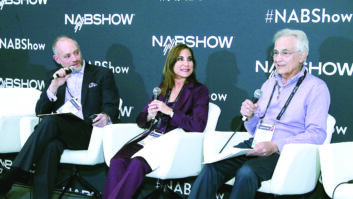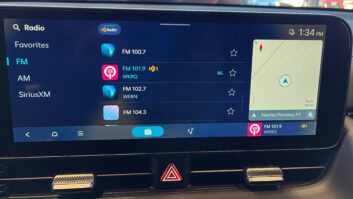Danish public-service broadcaster Danmarks Radio is implementing a digital archive project to safeguard its history for the future benefit of journalists, historians and the public.
According to Cultural Heritage Project Director Tobias Golodnoff, DR has several main goals: to preserve and safeguard audio material, to ensure that DR makes the archives broadly available and, along with the rest of the arts sector, to build a digital strategy to secure archives of benefit to the educational sector.
Internal analysis
“DR played a pioneering role in bringing digital to radio, with Web radio in 1996, the launch of DR Classical, offering round-the-clock classical music in 1999,” said Henrik Heide, commissioning editor with DR.
“And today,” said Heide, “DR operates some 30 Internet radio channels and offers 15 DAB radio channels, with over 250,000 DAB receivers sold in Denmark.”
In 2007, the combined DR channels had a 69 percent share of the market, leaving commercial competitors Radio 100FM and SBS far behind, with 7 and 4 percent respectively.
DR, financed by the government under a four-year agreement, employs some 3,000 staff and recently moved to new headquarters.
However, said Golodnoff, the public service contract with the government’s Ministry of Culture does not say anything about digitization or archiving.
During the planning phase for its relocation, DR conducted an internal analysis to see what it would cost to secure its archives.
The estimate was about 300 million Danish kroner, or about $58 million. “Money we did not have,” said Golodnoff. “In 2006,” he said, “the Danish government issued special funding of 10 million euros ($14 million) to start the digitization process and I am convinced that, in the next two or three years, we will somehow find the other resources necessary.”
DR set up a special department, with Golodnoff as project director, assigned to digitize the archives and to prepare them for production.
Vintage material
“We are talking about some 575,000 hours in total, of which 80 percent are radio sound files,” said Golodnoff, “basically DAT and quarter-inch open-reel tapes.”
In all, said Golodnoff, DR has 350,000 hours of audio stored on DAT — “the complete 1/1 collection of everything we broadcast on all of DR radio channels since 1989.”
Another 120,000 hours of quarter-inch tape contain live recordings, production footage and vintage material. Archiving vinyl records and CDs does not form part of the project.
The digitization project is different from the DR digital log, a self-developed system DR uses to back up its programming. That archive is shared with the DR online environment, the disk-drive stations and desktop computers, allowing DR collaborators to produce radio from virtually any workstation in the building.
Golodnoff said that even though DR has a well-equipped digitization department in-house, the public broadcaster opted to contract with an external company to take on the huge assignment.
“We can digitize any format available but we operate differently from archiving companies. We digitize ‘ad hoc,'” he said.
Special consultants
“It is quite expensive too and, for the archiving project, we tried to use economies of scale, covering the whole digitization from scratch to end,” said Golodnoff.
“There are a lot of private vendors that are better equipped for this kind of digitization,” he said. “Also, when, in 10 years or so, the process is finalized, we will not need that kind of specific competence internally, so it would be a waste of money to build up a huge digitization unit we would then have to close.”
However, said Golodnoff, the in-house DR digitization team do “excellent” work and are operating as special consultants for the whole project. “We have got really good deals because we have these very skilled experts on board and know exactly what we would like our collaborators to help us with.”
DR, as a public broadcaster, issued a European Union-wide call for bids for the assignment, which included two video archiving tasks alongside the extensive radio inventory.
Belgian company Memnon won the tender for the complete DAT project. The quarter-inch material is in better condition and will be part of a later digitization phase, said Golodnoff.
DR signed the contract with Memnon — said to be the largest digital archiving assignment in Europe in recent years — in July. The Brussels-based company gained experience with earlier jobs for Radio Suisse Romande, the British Library and the Institut National de l’Audiovisuel in France.
New knowledge
Since its launch in 2005, Memnon had already digitized over 60,000 hours of archives.
“The DR contract is very important for us,” said Michel Merten, founder and managing director of Memnon, “because it underlines our ability to digitize huge quantities of audiovisual archives.”
The industrial-scale archiving job for DR involves the use of Sony Broadcast DAT players to create thousands of petabytes of PCM WAV audio files. Four NOA Audio Soultions MediLector4 systems, each of which can handle eight DAT decks in parallel, are being used to manage the ingest.
“Once digitized, the DAT collection will be interesting for research because it will contain everything that was ever broadcast since 1989. Cultural heritage is a large investment, but it does make sense,” said Golodnoff.
According to Golodnoff, the project will help DR make “better and more” radio. As well as safeguarding the heritage, he said, it will also generate a lot of new knowledge. “That is undoubtedly the most visionary part of this digitizing project.”
Since the archive will remain part of the public domain, DR will not use it commercially but will make the material available to the public via the Internet, hopefully in 2009.
Marc Maes is a free-lance media and music industry journalist based in Antwerp, Belgium. Contact him via e-mail at [email protected].







